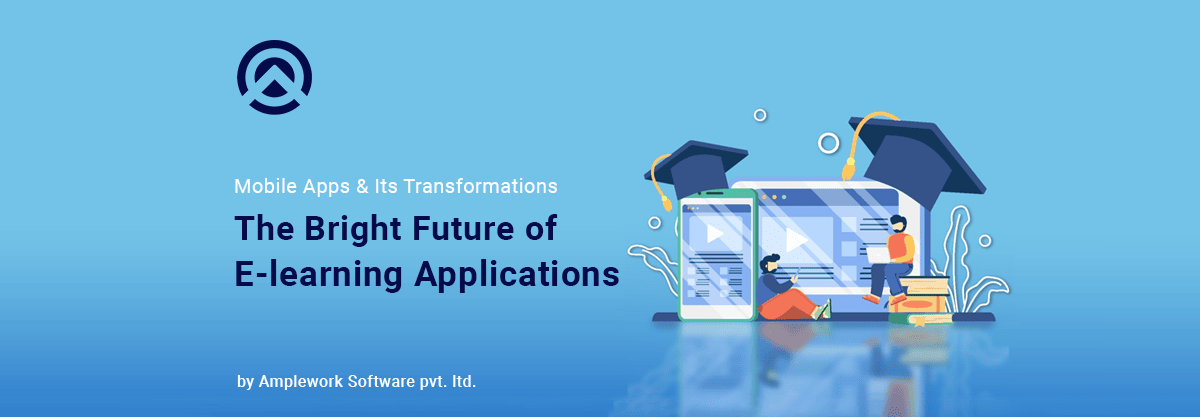In this digitally advanced era, learning is not restricted to the classroom or a computer screen only. The innovation of E-learning applications is making the process of learning handy even at your fingertips. With the use of these mobile applications, the future of the educational field seems productive and bright.
The innovation of learning mobile applications got developed in the early twenties times. With the involvement of cloud computing the process of e-learning apps became more efficient and valuable. In present terms, these applications are getting developed with the involvement of Artificial Intelligence, data analytics, augmented and virtual reality, the use of different learning algorithms, and gamification. The results of the below-mentioned survey show an increase in mobile use in education. This shows education has an average of 67% positive impact on global users.
 Source: Pew Research Center, 2019
Source: Pew Research Center, 2019
This blog is prepared to enhance your knowledge about the utilization of mobiles within the education field. As the increase of mobile phones is continuously increasing and their use in learning is considered a positive action. If you want to acquire some knowledge in the future enhancement of E-learning applications. Then giving a quick read to this blog will blow your mind.
The Invention of Palm Learning with E-Learning Mobile Apps
E-learning applications have completely transformed the operational ways of the whole education system. Different technologies perform the accurate implementation of these applications. Which results in creating, delivering, and managing online education content. These technology-aided solution fuels a major desire of making learning accessible on a dynamic scale.
Traditional Learning Solutions or Outdated Technologies
Long back, the markets introduced the concept of online learning and worked on making a revolutionary impact in that era. But in the current times technology is at its peak that makes these solutions outdated. These traditional online learning platforms started to develop in the timeframe of the 1980s to 2000s. That era witnessed the development of the Learning Management System (LMS), Blackboard, and Dot.com. The factors which overcome the use of these traditional solutions are lack of providing proper level of engagement and unattractive, limited access, less flexibility, one-size-fits-all, limited social interaction, unresponsive toward feedback, ineffective assessment, ignorance to rapidly changing technology and content, limited data-driven insights, limitations of support and challenges in adding real-life skills.
Rise of Mobile Apps: The E-Learning Renaissance
The development of mobile applications started in the mid-2000s and addressed many services with these advanced applications. In the education field, mobile applications emerged with the implementation of Coursera, Duolingo, and Khan Academy apps. These applications became a change towards traditional education systems. After this e-learning platforms became a trend in the development as well as in the education industry. The major adoption of learning applications gained popularity during the Covid-19 pandemic. The long-term lockdowns-initiated acceptance of the possible solutions while not disturbing the security norms. The whole education system relied on online streaming of classes, marked attendance through apps, and even sat for exams at their home itself.
Technical Background of E-learning Applications

Mobile application development services consider proper application formation as a major requirement. Implementing e-learning applications requires them to be based on various technologies and tools. That makes them deliver the best content with ample quality. These are as elaborated below.
1. Content Authoring Tools
These tools work on the formation of learning content with interactive quality. This happens with the inclusion of multimedia elements like interactive assessments, animations, and audio-visual effects.
2. Data Analytics and Learning
E-learning application requires to be accurate and adequate. These implementations are only possible when the analysis of different data sets is being used in content creation. These insights focus on the factors like learner behavior, performance, and preferences.
3. Learning Management System (LMS)
known as the backbone of e-learning platforms which works for course content management, assessments, tracking of learners, and taking care of the registration process.
4. Responsive Web Design (RWD)
Responsible for accessibility of applications to different devices like desktops, smartphones, and tablets. It is a web design approach by which they would not get any problems with screen sizes and proper layouts.
5. Cloud Computing
This technique makes the content management of E-learning applications easy. A cloud-based mobile application provides easy access to learners of the knowledge. This is possible with the availability of an internet connection.
6. Application Programming Interfaces (APIs)
E-learning application developers implement APIs for the integration of external features. These are additions of video conferencing, communicable platforms, and content repositories for effective storage.
7. Multilingual Support
The integration of this technique works towards making learning possible in every diverse aspect. Students belonging to different backgrounds grab the major advantage of multiple language-integrated E-learning applications on a global scale.
8. Secure and Authentic Technique
As the scale of learning users is increasing day by day a secure platform becomes mandatory to be implemented. These techniques assure data security and protected user intellectual property. In this E-learning, the app developer implements authenticated and data-encrypted solutions or applications.
Upgradation with the recent tools and techniques makes these E-learning applications more advanced. Upgradation of knowledgeable content by different creators and instructional designers makes the application more valuable.
10. Content Delivery Networks (CDNs)
Effective network management provides fast and reliable content to E-learning users. CDNs work on making the availability of content material across geographically distributed servers.
11. Gamification Elements
E-learning mobile applications get more renowned with the help of gamification elements. These features are present in the form of pointers, leaderboards, and badges. This directly makes the learning application more motivating and empowering for tutors.
12. Accessibility Compliance
E-learning mobile applications are designed in a way that would not become a problem for a learner having disability issues. These applications are easily accessible and learners with disabilities can engage with the content without facing any problem.
Read more: Best E-learning App for running your business successfully
Social media is considered a main asset of this digital era. Integration of learning platforms with these platforms opens many interactive ways between the learners and the instructors. This shows effective collaboration, discussions, and knowledge-sharing practices with learners and tutors.
Beyond Borders & Future Expectations of E-learning Apps
The generation of mobile applications worked on the development of different sectors and these applications made many advancements in the field of education. Mobile apps have now become an essential tool for learners on a global scale. We can expect a better future for the development of these mobile applications with the advancement of technology.
1. Virtual Reality & Augmented Reality
These technologies work towards making the e-learning experience a reality. In this real experience learners can explore historical sites, can engage complex concepts, and acquire knowledge with the use of an experimental setup in a virtual world. This experimental setup can even make the learner perform practical surgery in an online mode. The implementation of both of these techniques is now becoming a technical trend that enables different features in an E-learning application. This makes learners interact with a completely virtual environment and proceed toward different technical advancements.
2. Artificial Intelligence
AI is the most advanced technology which holds the potential to revolutionize the future of e-learning. This technique works on adding personalized impacts on educational content creations and adds different features. Such as innovative content creation: AI algorithms have the capacity to filter out a huge variety of educational content from a variety of resources. The developers create real-time updated assessments through the development of AI-driven assessments, where the system adapts feedback on a real-time basis and updates responses at the same pace.

personalized content formation: analyze factors of the learner like strengths, weaknesses, and learning style for the formation of personalized content. analysis of emotions: this future aspect can work towards providing emotional and motivational support to the learners. With this intelligence, the learners can observe their whole e-learning journey. natural language processing: this can work on interacting with knowledge seekers with the help of AI-powered chatbots and virtual assistance. intelligent teaching: this tutoring scheme works towards renovating the traditional with virtual independence. And continuous learning and skill development: AI works towards analyzing market trends of the education system and updates the existing learning process accordingly.
Read more: MVP Case Studies: Lessons Learned from Successful Companies
3. Addition of ChatBots
Chatbots are growing as valuable components of e-learning mobile apps, revolutionizing the ways students interact with educational content. These intelligent virtual assistants provide immediate support, answer questions, and provide specific instruction, making the learning experience more alive and accessible. Chatbots with natural language processing capabilities can understand learners’ queries and respond in a conversational manner, improving user engagement. These can monitor students’ progress, offer customized learning paths, and administer exams to check capability. With continuous machine learning, chatbots enhance their responses over time, ensuring an ever-evolving and efficient learning support system. As a result, e-learning mobile apps enhanced with chatbot technology empower learners with 24/7 access to knowledge, facilitating progress and growth.
Challenges in the Innovative Development of E-learning Apps
The innovative development of e-learning apps comes with issues that developers and educators must overcome. These issues have an impact on the app’s design, functionality, and user experience. Here are some of the main problems mentioned below.
- Content Development Accuracy
The creation of educational content with the use of AI-aided solutions can lead to many issues that can reduce content quality. This can be used with unauthentic sources and low-quality content.
- Technical Compatibility Issues
The development of E-learning mobile applications is performed to serve a variety of users. In this case, compatibility issues with the devices can occur while using the learning application.
- User Experience (UX) Designing
E-learning mobile app development is considered a challenge as in this everything needs to be perfect. Which development of UX is the major factor which ensures smooth navigation and interaction.
The registration process of any learning app requires sensitive information of the user, that can be possibly misused when breached. Ensuring high-level security with AI-aided solutions can cause trouble in the coming future for E-learning applications.
Read more: Best E-learning App for running your business successfully
Final Outcomes
E-learning mobile apps are the future of the global education system and are able to provide revolutionary services. The availability of E-learning mobile app developers and requiring organizations are continuously increasing in the current times. While the use of mobile apps became a negative aspect globally, E-learning apps gained a positive image among the common generations. In markets, the development of these apps is easily accessible.
Amplework is a well-known company with a market-leading position having more than 5+ years of industrial experience. Our team has completed multiple development projects. Continuously delivering to our clients’ rigorous demands, based on a strong foundation of trust and reliability. This effort has resulted in a phenomenal revenue milestone of 200 million. Explore our website to order the great E-learning mobile app development services we provide.










